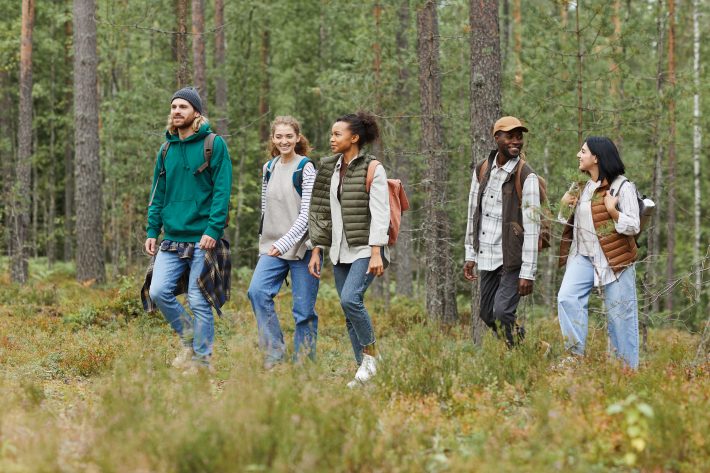The route forward for increasing ethnic diversity in the environment sector
The British Ecological Society joins environment charities in committing to a route map towards empowering and supporting ethnic minorities in the sector.

As part of our mission to foster a strong and diverse ecological community, the British Ecological Society is today committing to an action plan, along with 36 other environmental organisations, to cultivate a welcoming workplace environment where people of colour can thrive.
The plan, laid out in the Wildlife and Countryside Link’s route map, details the key steps environment organisations must take over the next 5 years to increase ethnic diversity in the environment sector.
Racism in the environment sector
After farming and agriculture, the environment sector is the second least diverse field in the UK. People of colour make up only 4.81% of environmental professionals compared to 12.64% of overall UK Workforce. While some environmental charities have already taken the first steps in becoming more diverse, change in the wider sector is slow moving.
In 2021 and 2022 the Wildlife and Countryside Link, alongside diversity and leadership experts, Full Colour, surveyed over 2000 environmental professionals, collecting both qualitative and quantitative data on racism and ethnic diversity in the environment sector.
The environment sector fails to make use of the passion, talents and perspectives that the diverse communities of the UK can provide
Their findings revealed that the sector holds a huge appetite for change yet experiences ongoing issues with a lack of action and implementation.
Speaking with people of colour, CEOs, and EDI Leaders, the researchers found that 86% of leaders believe increasing ethnic diversity should be a top priority for the sector, yet only 22% currently believe it is. One major barrier to implementing change was an uncertainty on how to act, as while 86% of organisations have considered the issues or taken some action, only 4% have an action plan which is consistently implemented.
The research also revealed concerning findings, in particular, that all people of colour surveyed said that there was overt or covert racism in the sector.
With the data from the survey in mind, Link and Full Colour developed a five-year plan to convert the appetite for change displayed by organisations into meaningful action.
An ecological network for racial and ethnic equality and diversity
As a society we recognise the unique barriers underrepresented and marginalised ethnicities face as a result of systemic racism. Ethnic diversity in the environment sector is very low, and as such individuals often find they are the only person of colour in their places of work and study.
As a response to the injustices and institutional racism displayed in the events of 2020, a small group of our members launched the REED Ecological Network – a supportive platform offered through the BES for ecologists from under-represented & marginalised ethnicities.
The network acknowledges that its vital role is to provide a safe place for people to come together to share perspectives, advice and more critically to offer peer support for career progression.
The BES has sealed its commitment to breaking down the barriers and removing the challenges that People of Colour face
The BES works to amplify the voices of the REED Ecological Network, its committee and its members through our various channels, while providing secretariat support, safeguarding, and duty of care functions.
Moving towards greater diversity in the environment sector is not just a task for today, it is a task for every day. As our network members become busier with their next career steps, they support the next generation to take over the leadership of the network and so it is always evolving.
We recognise the formation and support of our networks is not enough to address the lack of diversity in the environment sector. By joining this route map we are taking another step towards a future where everyone is welcome, supported, and able to thrive in the sector.
On BES’s commitment to the route map, Yadvinder Malhi, President of the British Ecological Society said:
“The environment sector lags behind in ethnic diversity and fails to make use of the passion, talents and perspectives that the diverse communities of the UK can provide in tackling our ecological and conservation challenges. The LINK report lays a clear route map for how this can be improved. I am pleased to see the British Ecological Society embedded in this drive for change and firmly committed to a more diverse future in every sense”

Zenobia Lewis, Chair of the British Ecological Society’s Education, Training & Careers Committee said:
“The Wildlife and Countryside Link Route Map is a timely and hugely important piece of work. For the first time, not only do we have a clear picture of what the sector really is – largely White, in some areas racist, but overwhelmingly ready and willing to change – we have a plan of action to make the sector accessible and welcoming to all who want to be a part of it.
“By signing up to the Link Route Map, the British Ecological Society has sealed its commitment to breaking down the barriers and removing the challenges that People of Colour face in our sector. I hope others will join us.”
Bringing environmental charities together to deliver targeted change
Full Colour’s investigation determined there were four core areas that need addressing to reduce the barriers for people of colour joining, progressing, and thriving in the environment sector. The route map sets a common goal and milestones to strive towards through improving workplace culture, transparency, action on racism, and organisational plans and practices.
There is no one size fits all approach to deliver change. The developed route map is supportive, not prescriptive and outlines overarching aims for all organisations across the environment sector to work towards together.
These sector wide actions include: training to debias recruitment and development; in-depth research on racism in the sector; HR, leadership and management diversity and anti-racism training; and peer learning circles.
We have a plan of action to make the sector accessible and welcoming to all who want to be a part of it
Over the coming months the BES will review the actions outlined in the route map to determine the best course of action, specific to our society, to continue to empower and support ethnic minorities in the workplace.
Our Statement of Commitment
Our organisation is committed to achieving the outcomes of this route map to create a more ethnically diverse and inclusive environment movement. Organisations across the sector may take different paths to achieve these changes, but we are united in our conviction that change is necessary. We intend to create a more inclusive culture and more inclusive ways of working, to address racism and barriers to progress for people of colour, and to increase our ethnic diversity. We are determined to ensure that everyone has the opportunity to be part of our vital environmental mission.
Read more about LINK’s research and route map
For a full break down of the Wildlife and Countryside Link’s route map to increase ethnic diversity in the environment sector visit this website.
Join the REED Network
If you are an ecologist of colour or working in the environment sector reach out to the REED network to get involved for training, mentorship, and support opportunities. The REED Ecological Network is open to every person of colour with an interest in the environment regardless of whether you are a member of the British Ecological Society.
Like what we stand for?
Support our mission and help develop the next generation of ecologists by donating to the British Ecological Society.